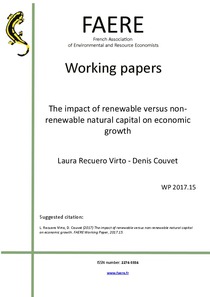The impact of renewable versus non-renewable natural capital on economic growth
"This paper examines whether natural capital is a robust determinant of economic growth, distinguishing the contribution of direct and indirect effects in renewable and non-renewable natural capital. Our hypothesis is that renewable natural capital may have a rather indirect but more important...
| Main Authors: | , , |
|---|---|
| Institution: | ETUI-European Trade Union Institute |
| Format: | TEXT |
| Language: | English |
| Published: |
FAERE
2017
|
| Subjects: | |
| Online Access: | https://www.labourline.org/KENTIKA-19394661124911128439-The-impact-of-renewable-versus.htm |
| Summary: | "This paper examines whether natural capital is a robust determinant of economic growth, distinguishing the contribution of direct and indirect effects in renewable and non-renewable natural capital. Our hypothesis is that renewable natural capital may have a rather indirect but more important impact on economic growth than non-renewable natural capital, particularly through human well-being. In contrast, non-renewable natural capital can be a source of immediate financial wealth, but can have adverse social and environmental effects. To test this hypothesis we use a data set on 83 countries for the period 1960-2009 to compare the relevance of proximate and fundamental theories to explain economic growth. We find some evidence of an indirect negative impact of renewable natural capital in wealth on economic growth through through human well-being and, more precisely, population growth rates and fertility. This is particularly the case for countries with higher levels of human development. In contrast, the share of non-renewable natural capital in wealth has a direct positive impact on economic growth in countries with lower income inequality and higher institutional quality. This finding reflects the effect of capital accumulation in the domestic economy, as capacity constraint are relaxed. Finally, countries with higher income per capita, higher human development and higher institutional quality have a higher share of higher renewable natural capital per capita, although they also have a lower share of lower renewable natural capital in wealth. Such result emphasises that renewable natural capital is very necessary for people (per capita), hence isa primary concern for empowered countries, although such capital contributes less to wealth, and economic growth, in these countries . Our results question the way "wealth" and economic growth are defined in economics when the effect of natural capital is examined." |
|---|---|
| Physical Description: | 48 p. Digital |

